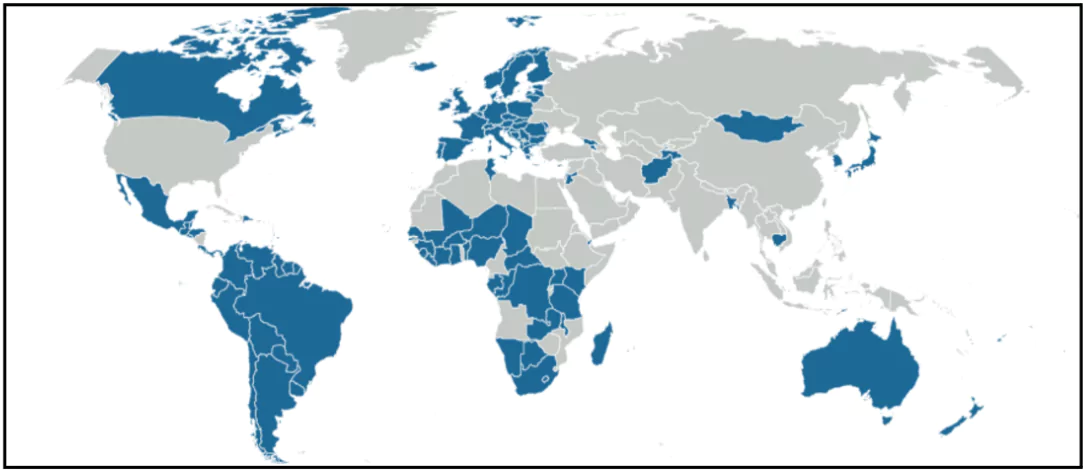Recently, Israel and its allies denounced the International Criminal Court’s decision to issue an arrest warrant for Israeli Prime Minister Benjamin Netanyahu.
Key Highlights on the Arrest Warrant
- ICC Arrest Warrants: The International Criminal Court issued arrest warrants for Israeli Prime Minister Benjamin Netanyahu, Defense Minister Yoav Gallant, and Hamas leader Mohammed Deif, sparking international debate.
- Support to the Warrant: United Kingdom and Canada said that they would “abide” by the arrest warrant issued against Israeli Prime Minister Benjamin Netanyahu by the International Criminal Court (ICC).
- Continued Hostilities: The violence reflects escalating tensions between Israel, Gaza, and neighboring regions, intensifying the humanitarian crisis.
Enroll now for UPSC Online Classes
About the International Criminal Court (ICC)
- The International Criminal Court (ICC) is the first permanent international court established to investigate and prosecute individuals accused of serious international crimes.
- Establishment and Headquarters: The ICC was adopted by 120 states on July 17, 1998, through the Rome Statute, and officially took effect on July 1, 2002.
- Headquarters: The Hague, Netherlands.
- Jurisdiction: The Rome Statute grants the ICC jurisdiction over four main crimes:
- Genocide
 War crimes
War crimes- Crimes against humanity
- The crime of aggression
- The ICC can only deal with crimes committed on or after July 1, 2002.
- Membership: The ICC has 124 member states. However, several major countries, including India, the United States, China, Russia, and Israel, are not parties to the Rome Statute.
- Palestine became the 123rd member in 2015.
- Malaysia became the 124th member in 2019.
- Languages: The ICC operates in six official languages: English, French, Arabic, Chinese, Russian, and Spanish.
- Enforcement: The ICC’s decisions are binding; however, it lacks its own police force. The enforcement of its decisions relies heavily on state cooperation, which is critical for the arrest and surrender of suspects.
- Relation with the United Nations: The ICC is not a United Nations organization but maintains a cooperation agreement with the UN.
Immunity under the Rome Statute
- General Rule (Article 27): Under Article 27 of the Rome Statute, no individual, including a head of state or government, is immune from prosecution before the ICC.
- The principle emphasizes equality before the court, ensuring that no official capacity grants immunity.
- Exception (Article 98(1)): An exception to Article 27 exists for officials from states that are not members of the ICC, such as Israel.
- ICC member states cannot be compelled to arrest or surrender such officials if it conflicts with their international obligations regarding immunity.
- Acceptance of Jurisdiction (Article 12(3)): Article 12(3) of the Rome Statute provides that a state not party to the Statute can accept the court’s jurisdiction over a specific crime.
- The state must make a declaration to the Registrar and agree to cooperate with the ICC without delay or exception.
Key Features of ICC rulings
- Binding Decisions: The ICC’s rulings must be upheld by its members.
- Limited Enforcement Mechanisms: Without its own police force, the ICC depends on the willingness of states to enforce its decisions.
- Independent Status: While not part of the UN, it collaborates with the organization under a formal agreement.
Check Out UPSC NCERT Textbooks From PW Store
ICJ Vs ICC
| Aspect |
International Court of Justice (ICJ) |
International Criminal Court (ICC) |
| Established in |
1946 |
2002 |
| Authority derived from |
- States that ratify the UN Charter become parties to the ICJ Statute.
- Non-UN member states can also become parties to the ICJ by ratifying the ICJ Statute.
|
- Rome Statute (Signed by 139 countries, and 123 have ratified it.)
- India is not a signatory to the Rome Statute.
|
| Relationship with UN |
Official Court of UN |
- Independent
- UNSC may refer cases to ICC
|
| Headquarters |
The Hague, Netherlands |
The Hague, Netherlands |
| Type of Court |
Civil court |
Criminal Court |
| Jurisdiction |
UN Member States (i.e. National Governments) |
Individuals |
| Scope of Work |
- Legal disputes between parties
- Provides advisory opinions
|
Criminal prosecution of individuals |
| Subject Matter |
Sovereignty, boundary disputes, maritime disputes, trade, natural resources, human rights, treaty violations, treaty interpretation, etc. |
Genocide, crimes against humanity, war crimes, crimes of aggression. |
| Funding |
Funded by UN |
- Contribution from state parties to the Rome Statute,
- Voluntary contributions from the UN, governments, international organizations, individuals, corporations and other entities.
|
| Is India a member? |
Yes |
No |
![]() 26 Nov 2024
26 Nov 2024

 War crimes
War crimes